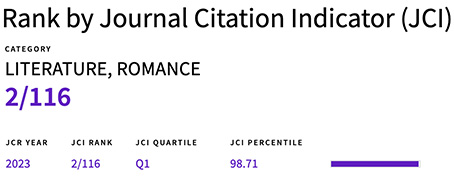Review Guidelines
Celestinesca is ruled by the ethical bases of the Code of Conduct and Best Practice Guides for Journal Editors of the Committee on Publication Ethics (COPE). What follows is a selection and adaptation of some fundamental ethical criteria for reviewers.
1. Commitment
Celestinesca resorts to prestigious celestinesque scholars for its peer review process. Their busy schedules do not always allow them to commit to review manuscripts in the allotted time. We expect honesty from our reviewers about their availability for reviewing manuscripts for Celestinesca and that, before committing to the review, they take the following into account:
-
Reviewers will accept reviewing manuscripts only if they will be able to complete it in the 4 weeks allotted.
-
If, during the 4 weeks allotted for reviewing, reviewers realise that they will not be able to complete the review on time or not at all, they will contact the journal as soon as possible, so that the necessary measures will be taken.
-
Reviewers commit to ensuring the anonymity of their reviews. More information in Ensuring an anonymous evaluation.
We recommend reading this Description of the review process before starting the review to start getting familiar with the OJS platform.
2. Review Etiquette
The Editorial Team of Celestinesca conceives reviews as constructive criticisms aimed at making the best of the reviewed articles. Authors have to be able to use the review reports to improve their articles and, at the same time, gain a clear idea of strengths and weaknesses. Since peer review should be an enriching exchange between colleagues of the same field, the Editorial Team of Celestinesca expects from their reviewers:
-
Objectivity
-
Constructive criticisms
-
Honesty
-
Respect, in particular with regard to the tone of the review report
3. Acceptance/Rejection Criteria
Celestinesca publishes original research connected to Celestina (or related works). These articles may deal with its interpretation, historical context, imitations, continuations, translations, stage adaptations, etc. from different points of view: critical, literary, stylistic and linguistic, etc. Quality assessments of the reviewed articles will take the following elements into account:
-
Research: Is it a research article? Are academic conventions regarding wording, bibliography, referencing, etc. followed?
-
Originality: Does it contribute anything new or original to the field of celestinesque scholarship? If it does not contribute anything new or original, does it contribute a new focus or does it review existing perspectives in a relevant manner?
-
Relevance: Is it more or less relevant for the field of celestinesque scholarship? Is it interesting enough to be published?
-
Title, abstract and keywords: Are they appropriate and descriptive?
-
Structure and style: Is the article well written, well organised and structured, so that readers can understand it?
-
Argumentation and conclusions: Are the main ideas of the articles supported in a relevant manner, so that readers can follow the argumentation until the end? Are conclusions clear? Can they be concluded from the previous arguments?
-
Methodology: Is there any evidence of a methodology? If there is, is it appropriate? If the methodology is explicitly addressed in the article, is it applied as it is said it will?
-
Bibliography: Is it relevant? Is it actual?
-
References: Is there a dialogue with previous scholarship? Is previous scholarship referenced correctly? Is the author familiar with the referenced scholarship?
We recommend that review reports refer to these aspects. We also recommend that improvement suggestions focus on these aspects.
4. Ethical conflicts
In foresight of the possibility of ethical conflicts arising during the review process, reviewers have to comply with these requirements:
-
If, despite the double blind system, the reviewer were to recognise the author of the article and this might arise a conflict of interest, the reviewer will inform the journal as soon as possible, so that the necessary measures can be taken
-
If the reviewer considers that the article is discriminatory or does harm the dignity of any person(s) or group, he/she will inform the journal as soon as possible. The same applies to articles written with potentially damaging intent or which could be used with potentially damaging intent.
-
If the reviewer suspects that the author might have plagiarised, he/she will inform the journal as soon as possible.
-
If the reviewer suspects that the article might be deceitful, he/she will inform the journal as soon as possible
In the case of ethical eventualities that are not included in this list, please contact the journal first.
IMPORTANT
In accordance with the current regulation, a list of external reviewers that have collaborated with Celestinesca is published every three years. By submitting their review reports, reviewers accept to include their name, surname and institutional affiliation in that list.
In addition, reviewers can validate their collaboration with Celestinesca via Publons.




